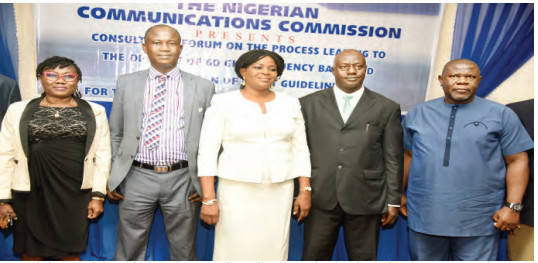NCC set to licence amateur radio services, 60GHz band in Nigeria
In line with global best practice, the Nigerian Communcations Commission (NCC), the telecons industry regulator, said on Tuesday it would licence the amateur radio services and the 60GHz band designed to open up spectrum licences that have been relatively scarce. Addressing stakeholders at a consultative forum in Lagos to announce the opening of the 60GHz […]


In line with global best practice, the Nigerian Communcations Commission (NCC), the telecons industry regulator, said on Tuesday it would licence the amateur radio services and the 60GHz band designed to open up spectrum licences that have been relatively scarce. Addressing stakeholders at a consultative forum in Lagos to announce the opening of the 60GHz spectrum and presentation of the draft guideline for the deployment of amateur radio in Nigeria, the Executive Vice Chairman of NCC, Prof. Umar Garba Danbatta, who was represented by the Director, Research and Development at the NCC, Mrs. Abigail Sholanke, said radio frequency spectrum is the fundamental resource for the provision of wireless communication services and has increasingly become scarce due to the emergence of new technologies and the growing demand for wireless services.
“In order to facilitate strategic collaboration and partnership with relevant stakeholders, facilitate broadband penetration, optimise spectrum usage and its benefits, as well as ensure regulatory excellence and operational efficiency among others, the Commission has decided to yet again to provide an avenue for stakeholders and users of telecommunication resources, to converge and make inputs to be considered in the opening up of the 60GHz spectrum bond and draft regulatory framework for amateur radio.,” Danbatta said. At present, radio spectrum in the 60 GHz band also known as the V-band, is yet to be opened for deployment of services in Nigeria.
The Commission recognises that to boost the eminent advantages that are coming with the 5G abs to also support indoor short range machine to machine communication, there are advantages in the opening of the band for unlicensed applications, Danbatta added. Explains further, Danbatta said the global unlicensed band exists on 57-64GHz, a wide spectrum of up to 7GHz, and it is largely uncontested compared to the 2.4GHz and 5GHz public bands currently used for Wi-Fi.
Giving detailed presentations of the planned licensing of the amateur radio and 60GHz spectrum band, the Director, Spectrum Management and Administration, Austin Nwaulune said the 60GHZ unlicensed band, allows operators the opportunity to control it the way they want to in offering various services and in carrying out various operations like backhauling, last mile services, fixed and mobile broadband, among others.
He however said the use of the spectrum must come under the regulation of NCC. Nwaulune further explained that the 60GHz spectrum would be subject to approval by the National Frequency Management Commission. Speaking on the benefits, Nwaulune said the 60GHz spectrum comes with socioeconomic benefits through the enhancement of broadband service delivery, such as ease the pressure on currently utilised public spectrum bands used for WiFi, utilisation of Green Field Spectrum band, its utilisation would bring moderate revenue for the government through equipment type approval.
The purpose of the amateur radio frequency, according to Nwaulune, include Noncommercial exchange of messages; Intercommunication; Self-training; Private recreation; Wireless experimentation; and Technical investigations. The purpose of the framework is also to provide a clear and comprehensive outline for amateur radio operations in Nigeria. It shall describe, among other things, the authorisation, rules, standards, important procedures and operating limits for amateur operations.
